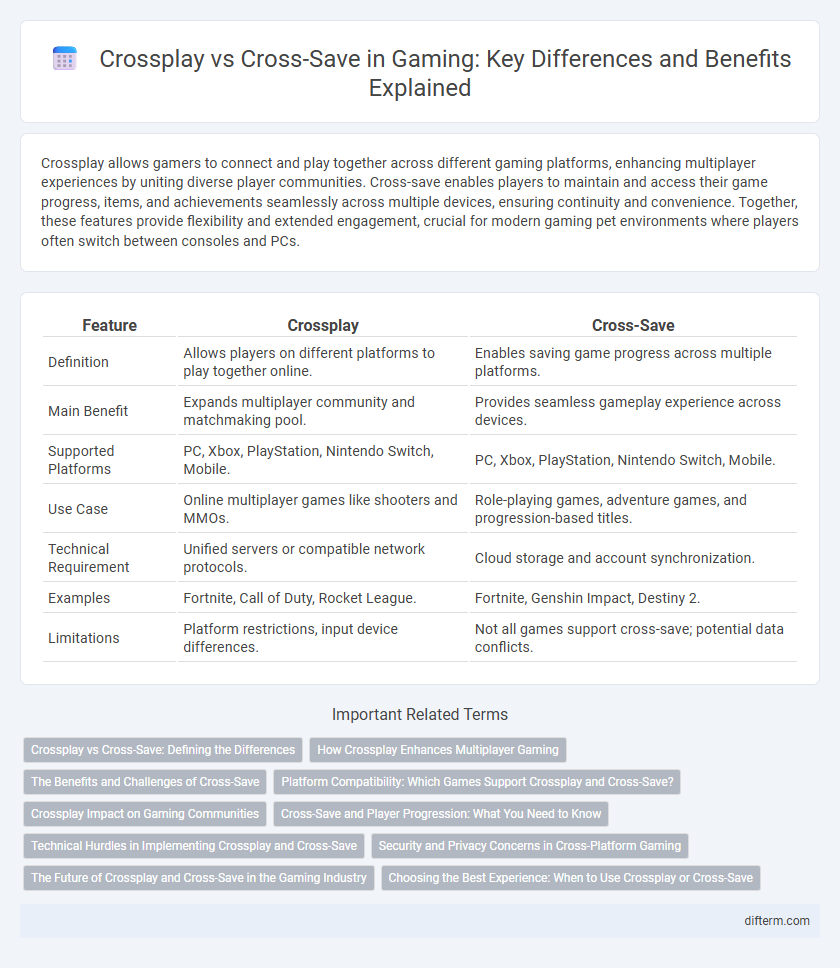Crossplay allows gamers to connect and play together across different gaming platforms, enhancing multiplayer experiences by uniting diverse player communities. Cross-save enables players to maintain and access their game progress, items, and achievements seamlessly across multiple devices, ensuring continuity and convenience. Together, these features provide flexibility and extended engagement, crucial for modern gaming pet environments where players often switch between consoles and PCs.
Table of Comparison
| Feature | Crossplay | Cross-Save |
|---|---|---|
| Definition | Allows players on different platforms to play together online. | Enables saving game progress across multiple platforms. |
| Main Benefit | Expands multiplayer community and matchmaking pool. | Provides seamless gameplay experience across devices. |
| Supported Platforms | PC, Xbox, PlayStation, Nintendo Switch, Mobile. | PC, Xbox, PlayStation, Nintendo Switch, Mobile. |
| Use Case | Online multiplayer games like shooters and MMOs. | Role-playing games, adventure games, and progression-based titles. |
| Technical Requirement | Unified servers or compatible network protocols. | Cloud storage and account synchronization. |
| Examples | Fortnite, Call of Duty, Rocket League. | Fortnite, Genshin Impact, Destiny 2. |
| Limitations | Platform restrictions, input device differences. | Not all games support cross-save; potential data conflicts. |
Crossplay vs Cross-Save: Defining the Differences
Crossplay enables gamers to compete or cooperate across different platforms such as PlayStation, Xbox, and PC, enhancing multiplayer experiences and expanding player communities. Cross-save allows users to transfer their game progress, achievements, and in-game items between devices, ensuring seamless continuation of gameplay regardless of hardware. Understanding the distinction between crossplay's focus on multiplayer interaction and cross-save's emphasis on data synchronization is crucial for maximizing flexibility in modern gaming ecosystems.
How Crossplay Enhances Multiplayer Gaming
Crossplay expands multiplayer gaming by enabling players on different platforms to join the same online matches, breaking down hardware barriers and increasing the player base for faster matchmaking. It fosters a unified gaming community, allowing friends to team up regardless of whether they use PC, PlayStation, Xbox, or Nintendo Switch. This interoperability boosts engagement and extends game lifespan through more dynamic and diverse multiplayer experiences.
The Benefits and Challenges of Cross-Save
Cross-save enables gamers to continue their progress seamlessly across multiple platforms, enhancing convenience and increasing player engagement by preserving game data in the cloud. Its primary benefits include flexibility in device choice and uninterrupted gameplay, which contribute to a more unified user experience. Challenges involve synchronization issues, platform restrictions, and potential data loss, requiring robust backend support and cooperation between game developers and platform providers to ensure smooth functionality.
Platform Compatibility: Which Games Support Crossplay and Cross-Save?
Crossplay allows gamers on different platforms like PlayStation, Xbox, and PC to play together in real-time multiplayer environments, with popular titles such as Fortnite, Call of Duty: Warzone, and Rocket League supporting this feature. Cross-save functionality lets players transfer their game progress, achievements, and in-game purchases across platforms, with games like Genshin Impact, Destiny 2, and Minecraft offering broad support for seamless data synchronization. Platform compatibility varies by game and developer policies, so verifying official support for crossplay and cross-save on specific platforms is essential for an optimized gaming experience.
Crossplay Impact on Gaming Communities
Crossplay has significantly expanded gaming communities by enabling players on different platforms to interact and compete together, fostering greater inclusivity and diverse player engagement. This connectivity enhances multiplayer experiences and reduces matchmaking times by broadening the pool of available players. The impact of crossplay also encourages developers to create balanced gameplay mechanics suitable for varied control schemes, further uniting disparate gaming ecosystems.
Cross-Save and Player Progression: What You Need to Know
Cross-save technology enables gamers to maintain their player progression across multiple platforms by synchronizing game data in real-time, ensuring seamless continuity regardless of device. This feature is essential for titles supporting diverse ecosystems like PlayStation, Xbox, and PC, as it protects in-game achievements, character levels, and inventory from being locked to a single platform. Understanding cross-save is crucial for maximizing gaming flexibility and preserving progress in expansive multiplayer environments and games with frequent updates.
Technical Hurdles in Implementing Crossplay and Cross-Save
Implementing crossplay requires overcoming complex network compatibility issues and synchronizing game states across different platforms with varying hardware and software protocols. Cross-save technology faces challenges in ensuring secure data transfer and consistent save file formats between disparate systems, often complicated by platform-specific encryption and cloud storage limitations. Both features demand robust backend infrastructure to maintain game integrity and player progress without latency or data corruption.
Security and Privacy Concerns in Cross-Platform Gaming
Crossplay and cross-save features enhance gaming experiences by enabling players to interact and continue progress across different devices, but they introduce significant security and privacy concerns. Crossplay requires robust data encryption to prevent unauthorized access and protect player identities during real-time interactions on multiple platforms. Cross-save involves sensitive data synchronization, demanding strict authentication protocols and secure cloud storage to safeguard personal information and game progress from breaches or data loss.
The Future of Crossplay and Cross-Save in the Gaming Industry
Crossplay technology enables gamers on different platforms to compete or cooperate seamlessly, significantly expanding multiplayer communities and enhancing user engagement. Cross-save functionality complements this by allowing players to transfer their progress across consoles, PCs, and mobile devices, promoting convenience and user retention. The future of the gaming industry hinges on integrating these features more deeply, fostering a unified ecosystem that supports diverse gaming preferences and drives broader market growth.
Choosing the Best Experience: When to Use Crossplay or Cross-Save
Crossplay enhances multiplayer gaming by allowing players on different platforms to compete together, ideal for expanding your community and maintaining active sessions. Cross-save focuses on continuity, enabling gamers to access their progress and in-game purchases across devices, perfect for those who switch consoles or prefer mobile and desktop options. Choosing between crossplay and cross-save depends on whether your priority is seamless multiplayer interaction or consistent game progression across hardware.
crossplay vs cross-save Infographic

 difterm.com
difterm.com